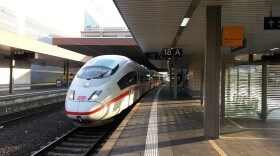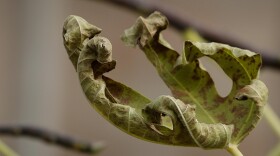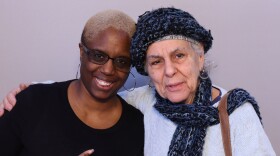A documentary shot with footage smuggled out of Alabama prisons may be in contention for an Academy Award. The nominees for this year’s Oscars will announced later this week. “The Alabama Solution” was shortlisted for “Documentary Feature Film” category.

Alabama Public Radio is proud to share the work of local artist Abi Brewer, who created an original painting exclusively for the station. Views of Home is done in collaboration for APR's 2025 Fall Pledge Drive, happening from September 10 - 19. The art is what Abi calls "a love letter to Alabama." The painting celebrates the different flora, fauna and landscapes of the Yellowhammer State.
News & Commentaries From APR
-
This week on StoryCorps, Nancy Ziccardi and Charles Flaherty discuss their personal history in the anti-war movement of the 1970s, and the ways in which their hippie days have shaped who they are now.
-
This week, A Reckoning Up Black Cat Hollow by Matthew F. Jones.
-
Suzanna's Kitchen is recalling over 13-thousand pounds of ready-to-eat grilled chicken breast fillet products over listeria concerns.The U.S. Department of Agriculture's Food Safety and Inspection service announced the recall on Friday. The items were shipped to distribution centers for food service sales in Alabama, Florida, Georgia, Missouri, New Hampshire, North Carolina and Ohio.
-
Preliminary numbers are showing a drop in Obamacare enrollment. The decline of roughly 800-thousand people is an early indication that allowing the enhanced premium tax subsidies to expire caused people to defer signing up for health insurance. A study by the Kaiser Family Foundation estimated that 130,000 Alabamians will be among the Americans who will lose their Affordable Care Act coverage.
-
Keeping your best friend safe in cold (even freezing) temperatures is vital to protecting your furry buddy!
-
Tuscaloosa’s Walt Maddox claims his city is being cheated. The Democratic mayor of Tuscaloosa said his city had over fifteen million dollars of sales taxes that were generated locally that were redistributed elsewhere.
-
On today's Keepin' It Real, Cam admits to packing something very strange on his recent trip. The result is an encounter he's always hoped for. It was the fulfillment of a long-held dream.
-
The Claudette Colvin Foundation announced that a viewing for the civil rights icon will be held on January 23rd at the Bushelon Funeral Home at 1 p.m. APR news reported this week on Colvin's death. Her refusal to give up her seat on a Montgomery bus helped spark the 1956 bus boycott. Her action came before Rosa Parks.
-
Broadband internet was featured during this week’s State of the State address by Governor Kay Ivey. Observers are wondering what form this will take. The state may reportedly rely on Starlink satellites in low income areas later this year.
-
Birmingham Mayor Randall Woodfin wants to see high-speed rail between his city and Atlanta.He proposed the idea at a recent speech at the Birmingham Kiwanis Club, noting it could cut rail travel time between the two cities from four and a half hours to less than one hour.
-
State lawmakers are confronting the possibility of new major costs tied to SNAP benefits.This comes as new federal requirements under the One Big Beautiful Bill Act are shifting administrative costs to states.The move forces Alabama to cover roughly 39-million-dollars.Beginning next year, the state could also face up to 200-million-dollars in addition expenses tied to payment error rates.
-
Alabama is still dealing with drought. The latest report from the U.S. Drought Monitor lists parts of Marengo, Greene, and Hale Counties as extremely dry. Severe drought includes about twenty counties. The Gulf coast is currently listed as exceptionally dry. APR spoke with people on the front lines of this issue
Latest News From NPR
- ASEAN won't endorse election in military-ruled Myanmar, Malaysia says
- Trump says U.K. return of Chagos Islands to Mauritius is reason to acquire Greenland
- Here's who's canceled their Kennedy Center performances since Trump took over
- The divorce between the U.S. and WHO is final this week. Or is it?
- Trump's Board of Peace has several invited leaders trying to figure out how it'll work
Alabama is known for football and white barbecue sauce. But we’re also making our mark in science, literature and the arts—and we helped put astronauts on the moon! Join APR news director Pat Duggins as he takes up topics like this with interviews on APR Notebook.
Dr. Don Noble, specializing in Southern and American literature, gives his weekly review on the work of Alabama’s finest authors.
Host Cam Marston brings fun weekly commentaries on generational and demographic trends to provide new ways to interpret the changing world around us.
Speaking of Pets with host Mindy Norton is a commentary for people who care about pets and want to celebrate that special relationship between humans and animal companions.
Sports Minded podcast with host Brittany Young features interviews with coaches, athletes and sports personnel. Insight, commentary and analysis on professional, collegiate and high school sports can be heard here.
Quick-Fire Quips is centered around people who stand out in Alabama. Host Baillee Majors presents guests with a questionnaire of playful personal questions and questions about the Yellowhammer State.
-
At least 45 people in nearly two dozen states have been sickened with salmonella food poisoning tied to the Super Greens brand of diet supplement powder, federal health officials said Wednesday.
-
Alabama lawmakers are looking a bill that would ban vaping in indoor public spaces. The new Alabama bill is called SB-9. It would prevent the use of vapes and e-cigarettes in public spaces. The legislation expands on the Alabama Indoor Clean Air Act introduced in 2003.
-
She’s covered presidents and prime ministers, but Tuscaloosa native Christi Parsons is still true to her "Tide fan forever" roots! The former White House Correspondent talks with Quick-Fire Quips Baillee Majors about journalism, superstitions and why Alabama’s story is much bigger than you think.
-
Claudette Colvin, whose 1955 arrest for refusing to give up her seat on a segregated Montgomery bus helped spark the modern civil rights movement, has died. She was 86. Her death was announced Tuesday by the Claudette Colvin Legacy Foundation. Ashley D. Roseboro of the organization confirmed she died of natural causes in Texas. The APR news team spent last year going "behind the scenes" of this pivotal time in the civil rights movement.
-
Governor Kay Ivey gave her final State of the State address last night. The Republican lawmaker’s time in office reportedly includes over sixty nine billion dollars in Capital investment, close to one hundred thousand new jobs, and the lowest unemployment rate in state history
-
Some construction work on the University of Alabama has led to a real life lesson in archeology. UA students will spend the coming weeks analyzing artifacts they dug up at a site dating back to the Civil War.
-
This week on StoryCorps, Buddhists Nancy Ziccardi and Katrina Robinson speak about their religion in relation to the predominantly Christian area of Selma, Alabama.
-
This week, Don reviews All the Beauty in the World: The Metropolitan Museum of Art and Me by Patrick Bringley.
-
NASA began demolishing part of its own history over the weekend. Crews at the Marshall Space Flight Center are removing the Propulsion and Structural Test Facility and the Dynamic Test Facilities. These structures prepared the engines for the space shuttle and the Apollo moon missions. Now, Artemis-2 awaits.
-
A group of Buddhist monks and their rescue dog are striding single file down country roads and highways across the South, captivating Americans nationwide and inspiring droves of locals to greet them along their route. The list of stops includes Alabama.

































